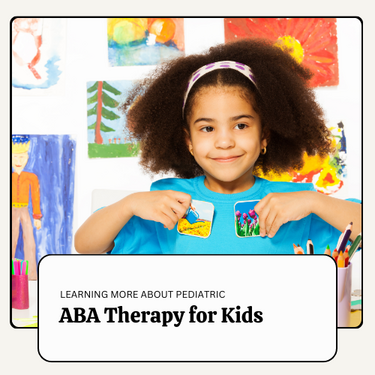
What is ABA Therapy?
ABA Therapy stands for Applied Behavioral Analysis and was developed in the 1960’s using the scientific method for the purpose of developing specific behavioral habits. The goal of ABA Therapy is to provide clients the opportunity to learn and receive positive reinforcement for useful, helpful, or socially appropriate behaviors. Although ABA Therapy is primarily thought of as a treatment for children who have an Autism Spectrum Disorder (ASD), ABA therapy is used for people of ages (children to seniors) and for different types of needs and behaviors, such as panic disorder, obsessive compulsive disorder, traumatic brain injuries, addictions, and more.
In the early development days of ABA Therapy, negative reinforcement was used in response to behaviors that were deemed harmful or unhelpful for learning and social integration. Modern ABA Therapy typically no longer provides negative consequences, rather the learner in ABA Therapy will receive no reinforcement for unhelpful, unsafe, or disruptive behavior.
ABA Therapy is not one size fits all and the treatment is very customizable depending on the goals of the individual receiving the treatment. Because ABA Therapy is most effective when parents reinforce ABA learning methodologies in the learner’s home and other familiar surroundings, it is essential that parents are closely aligned with the customization of the ABA Therapy treatment plan.
What is the controversy surrounding ABA Therapy?
Although ABA Therapy is recognized as a standard and effective treatment option for those who have an Autism Spectrum Disorder, there are strong feelings for and against ABA Therapy by parents, former clients in the autism community, and other treatment disciplines. The primary argument against ABA Therapy lies in the belief that there is value in neurodiversity. Human brain functionality is diverse, and many believe that it is not ethical or wise to attempt to “fix” people who have an Autism Spectrum Disorder.
The other side of the argument sites the US Surgeon General and the American Psychological Association claim that ABA Therapy is an evidence-based treatment option that has been proven as an effective way to halt harmful behavior and encourage successful social integration.
In recent years, ABA Therapy has made a move to become more inclusive to neurodiversity values and less regimented, however ABA Therapy is not for everyone. It is wise for parents and guardians to research for themselves if ABA Therapy is what is best for their child or teen’s specific needs.
Where is ABA Therapy provided?
ABA Therapy may be provided within the child’s home, a pediatric clinic, at school, on a job site, or even via telehealth. Additionally, ABA Therapy may be provided individually or in a group setting.
Who provides ABA Therapy?
A Board-Certified Behavior Analyst (BCBA) with a Master’s level certification in Behavioral Analysis provides ABA Therapy services. There is a national certification exam that a BCBA must pass, however an additional state license to practice is required. As with most state-based licensing, stipulations for licensure vary by state.
Other ABA Therapy services may include therapists and/or Registered Behavior Technicians (RBTs), both of whom are supervised by the BCBA. Together, this team will work with the parents and child under the direction of the BCBA to work towards the specific goals prescribed by the BCBA.
How long does ABA Therapy take?
Following a careful assessment analysis, a BCBA will work closely with the parents/guardians and child to develop a specific treatment plan and timeline unique to the child’s current behavioral patterns and future goals. There will be ongoing progress assessments, but typically ABA Therapy is prescribed for 10-40 hours a week and for up to three years. As a child reaches different developmental milestones and new challenges are identified, ABA therapy may be needed again.
Benefits of ABA Therapy
Once confirmed if ABA Therapy is best for your child, the benefits of ABA Therapy can be very rewarding as treatment goals (especially positive mental health and wellness goals) are learned and achieved. Children who feel empowered tend to have increased self-esteem and self-confidence. Parents who receive support through ABA therapy also may feel more equipped to help their child and experience less caregiver stress and burnout.
Other benefits of ABA Therapy include:
Improved communication skills
Integrative social and community involvement skills
Competency with self-care activities such as showering, dressing, toileting, etc.
A reduction or stop in self-harming behaviors
A decrease in tantrum behavior as new coping and communication methods are learned
Better quality play, leisure, and motor skills
Find ABA Therapy services
We suggest doing personal research and speaking with your pediatrician about ABA Therapy first to determine if ABA Therapy is best for your child’s specific needs. If so, your pediatrician can write a prescription for ABA Therapy, which may be needed for your insurance. Some insurance companies cover the cost of ABA Therapy or provide some form of benefit coverage. There are also scholarships and educational funds available for school-based ABA Therapy if your child applies and qualifies.
If you are ready to proceed, please visit www.KidsTherapyFinder.com and search our directory to find ABA Therapy treatment providers for you and your child today. If you need any help or have any questions, Contact Us and we'll see if we can help!

Sign up for our newsletter to get instant access to parenting resources sent directly in your inbox!
